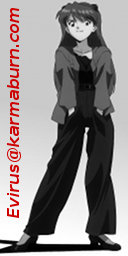|
|
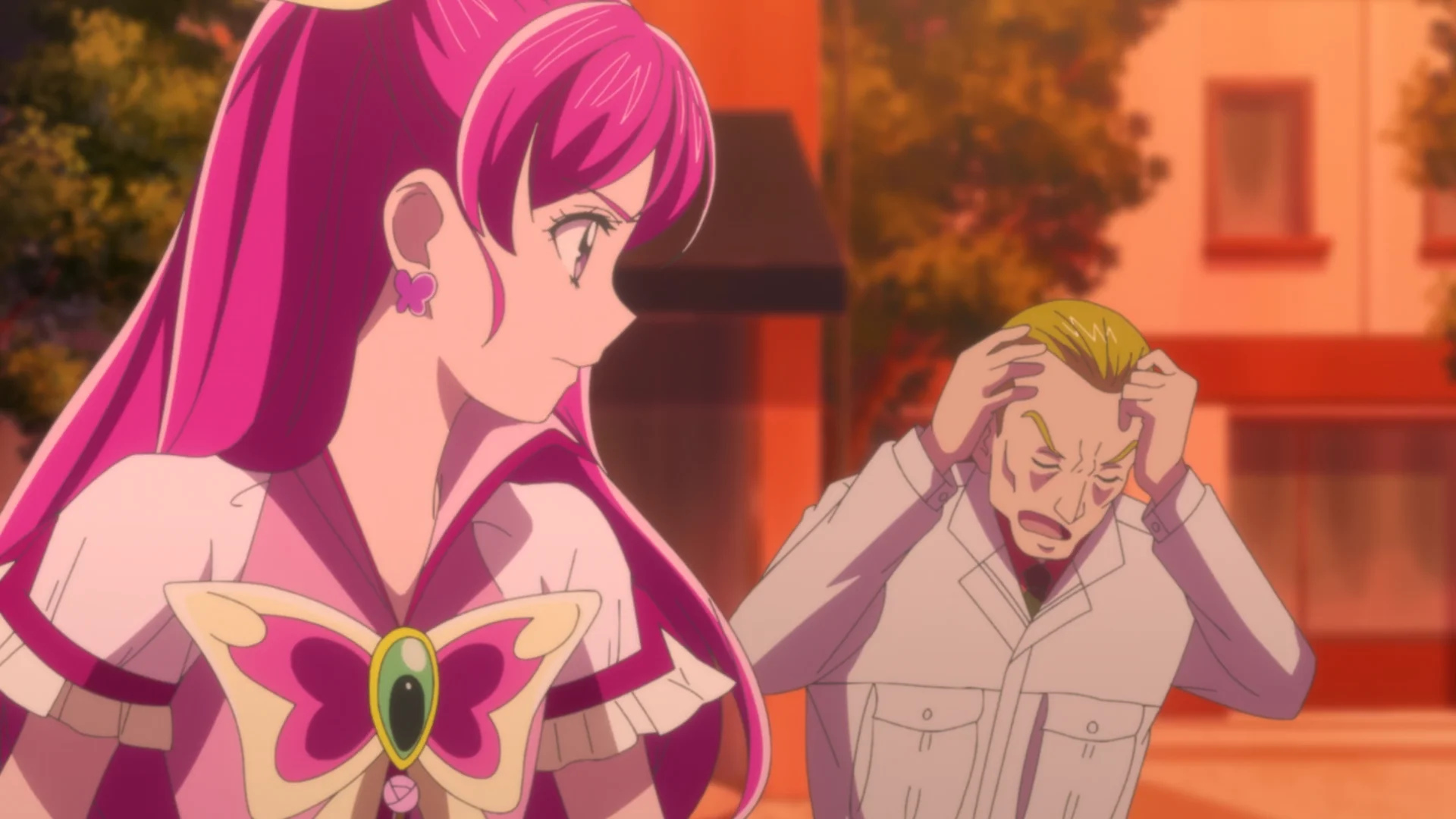
Believe it, Bunbee.
Should Kibou no Chikara ~Otona Precure '23~ (Power of Hope ~Precure Full Bloom~) be examined through the lens used for every other iteration in the Pretty Cure franchise, or should it be viewed (and judged) by standards applied to shows intended for adults? The expectations and allowances adopted can either magnify or diminish both the flaws (3DCG monsters, I'm looking in your direction) and the attributes of the series. I won't attempt to comprehensively address them all, but I bring this up now to acknowledge I'll be leaving some things unsaid. My attitude towards Otona Pretty Cure is generally positive, but you might catch a few laments if you follow me on the 𝕏 née Twitter.
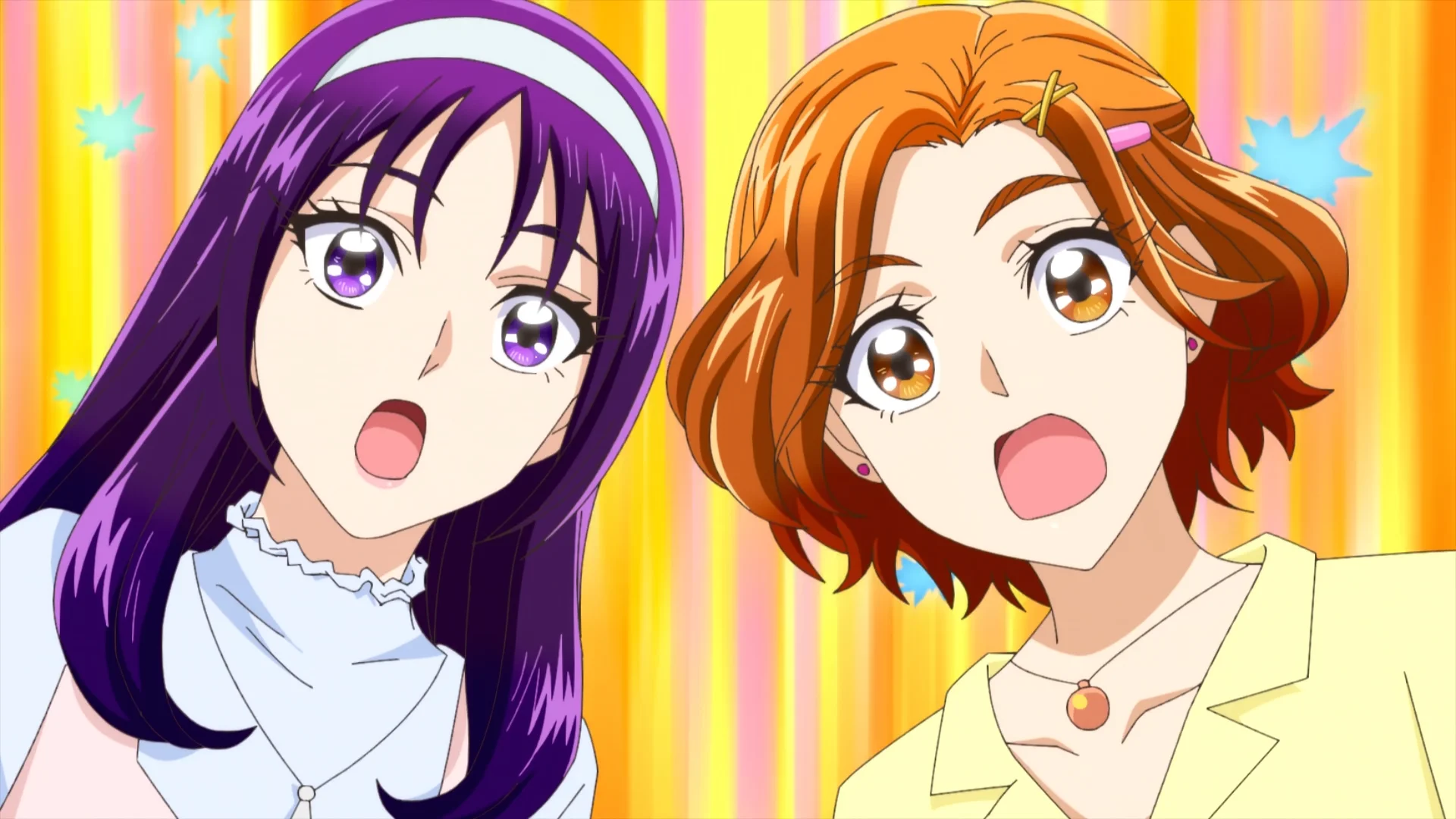
I'm shocked Saki ended up being the one with the best hair.
It still feels miraculous that Otona Precure exists at all. I also sort of got the sense that the production team shared this sentiment. Specifically, it seemed like I was watching a show being made by people who thought they only had one shot at this. That's not an unreasonable position to take. First Pretty Cure itself surely wasn't expected to launch a franchise that has run 20 years and counting. Maybe there will be more Otona Precure someday (the ending certainly leaves the possibility open), but it wouldn't be safe to assume there will be. Consequently, I got the impression there was pressure to cram as much as they could into the 12 episodes they had. (Yes, I'm aware there's some sort of Mahou Tsukai Precure! 2 thing planned, but I'm not expecting it to overlap with this.) Incidentally, there are spoilers the rest of the way out, so avert your eyes if you ain't watched this yet.
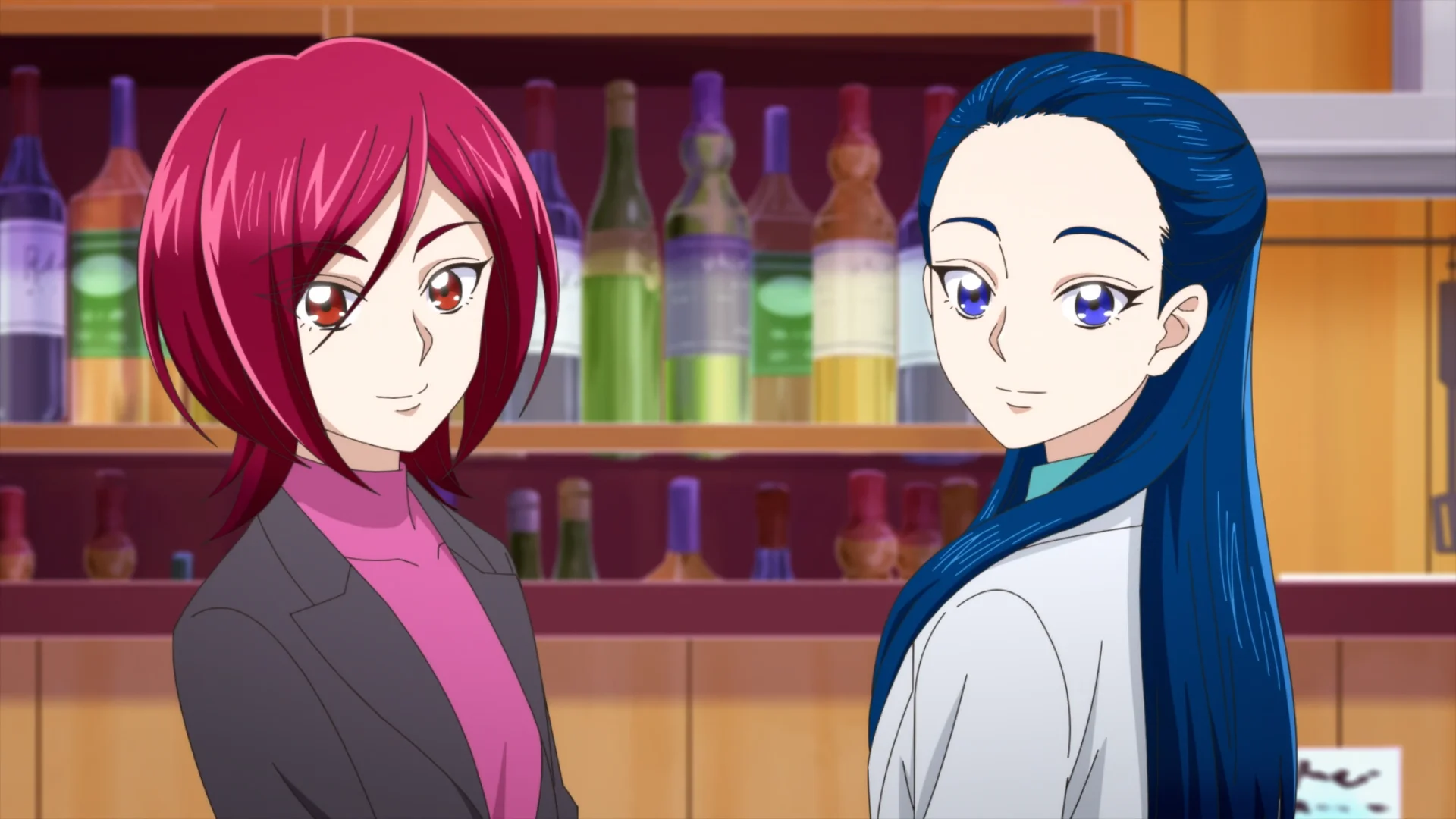
I wonder if all their paperwork is forged. I think they're technically illegal aliens.
Anyway, what I'm getting at is Otona Pretty Cure jammed a lot of stuff in here. Notably, Michiru and Kaoru finally got some recognition. As someone who has been constantly complaining about their omissions from team-up events and retrospectives, it was fantastic to see them return. Still, I'm on the fence about they way they were presented. Namely, I think they should still have at least some of the power they had in Splash Star. We did see them fly in the final episode, right? Possibly, they do have their powers, but chose to sit things out for the same reason Bunbee (who apparently does still have his powers) kept his head down and fled when pressed. But, yeah, this was a missed opportunity to officially confer upon them the Cure Bright and Cure Windy designations that they've long deserved.
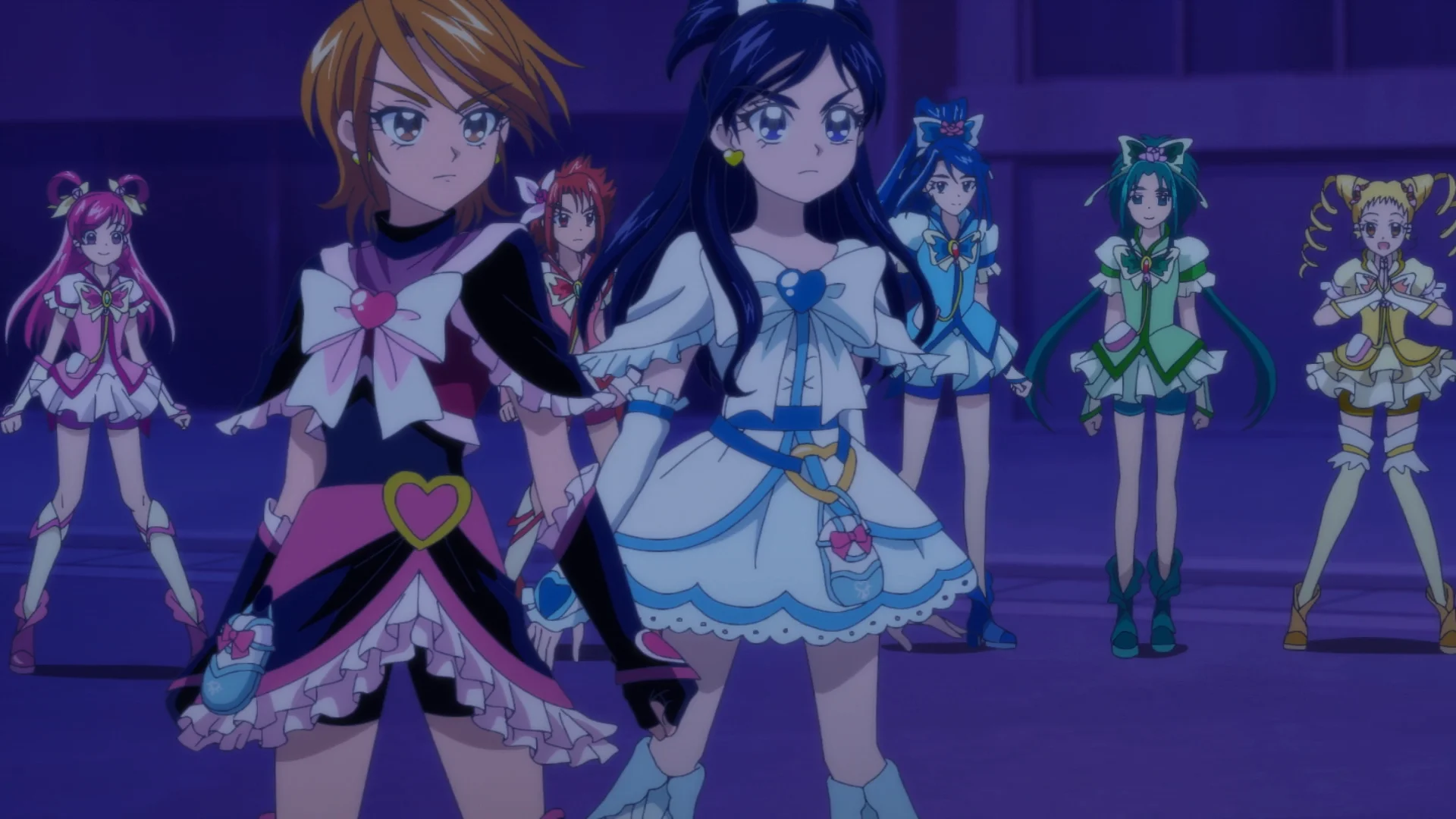
The opportunity to bring back the original battle costumes was right there!
So, no, Cure Bright and Cure Windy did not appear in any form, but Cure Black, Cure White, and Shiny Luminous all did. This was hidden from the promotional materials and made their appearance a bit of a surprise, but much less so considering it was telegraphed the instant Honoka's grandmother appeared in Otona Precure. As glad as I was to see them again, I would have preferred keeping them out of this season entirely, instead focusing on them in a future installment. Admittedly, that's difficult to do when there's no guarantee there will ever be any more later.
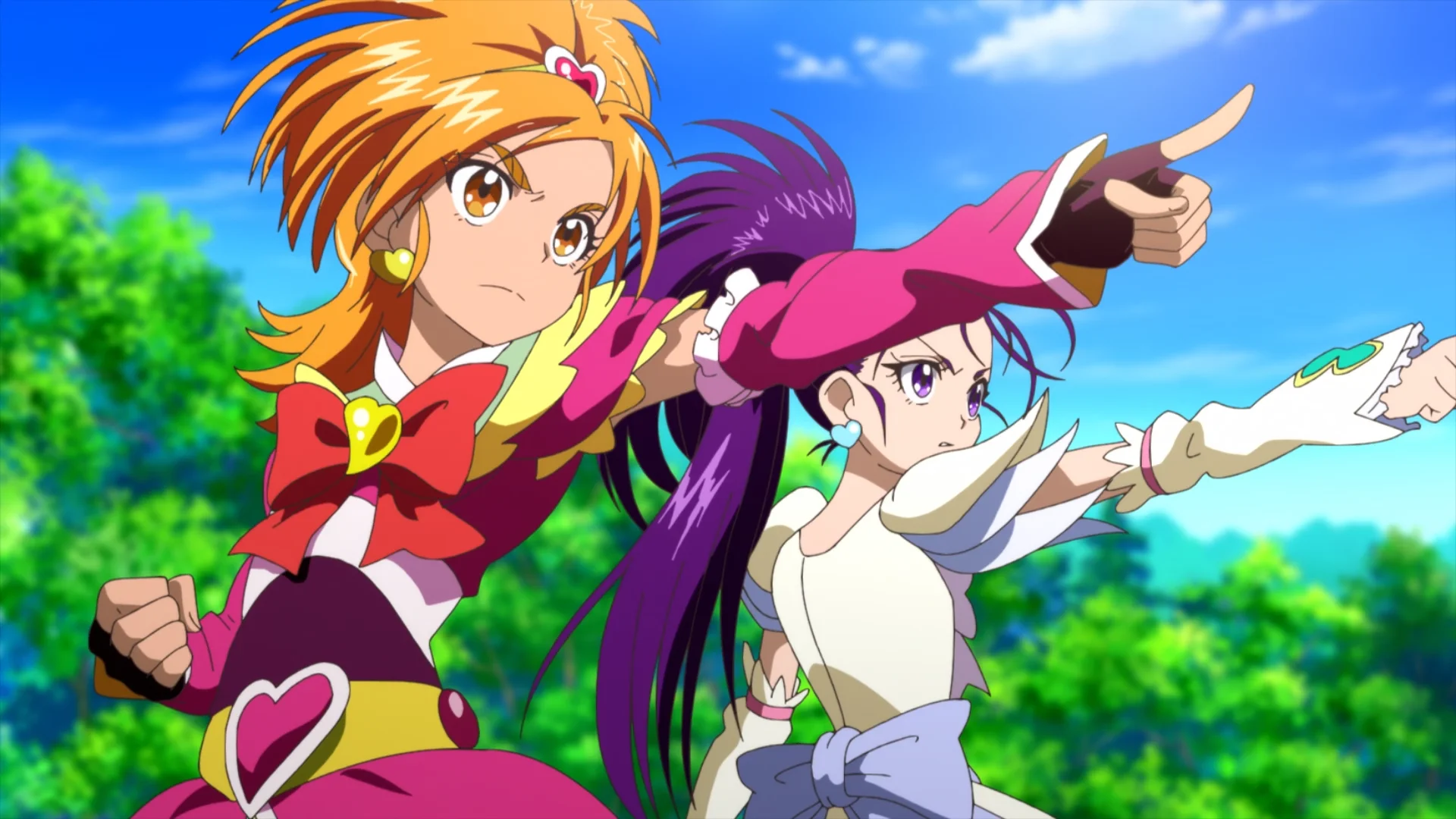
These two are so good.
I feel the need to point out the Max Heart and Splash Star teams were originally unable to unilaterally transform. They needed to be with their partners and their fairy counterparts. This would have been another reason to withhold first-generation Pretty Cure from Power of Hope ~Precure Full Bloom~. I would also have been okay with this limitation preventing Cure Bloom and Cure Egret from participating in the battles. Don't get me wrong, I love that Splash Star was included in this project, but Saki and Mai meant more to me than Bloom and Egret here. I think they could have still meaningfully contributed as regular adults who couldn't transform into Pretty Cure again, in contrast to the Yes! Cures who could.
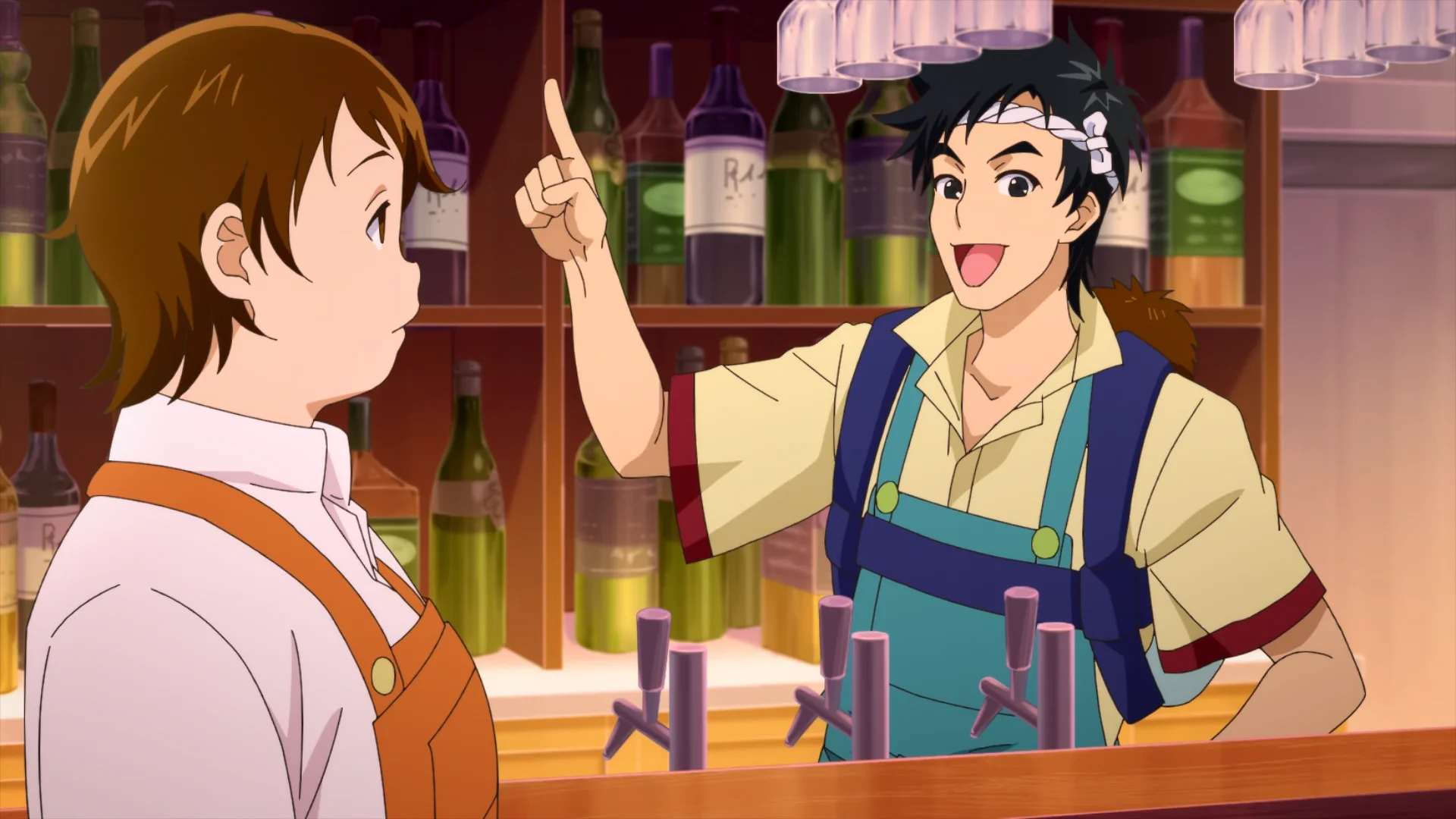
I wasn't expecting these two to be in the series at all.
Ultimately, the caveat expressed at the very start of Otona Precure (that there are many different possible futures, arguably making none of them capital-C Canon) ends up being the important factor. Maybe this is the possible future where Black, White, Luminous, Bloom, and Egret can all transform without their fairy mascot counterparts. Maybe this is the possible future where individual action can overcome industrialized irresponsibility. Maybe this is the possible future where the queen of Palmier Kingdom still works a day job in Japan. Oh. I'm going to have to address this, aren't I?
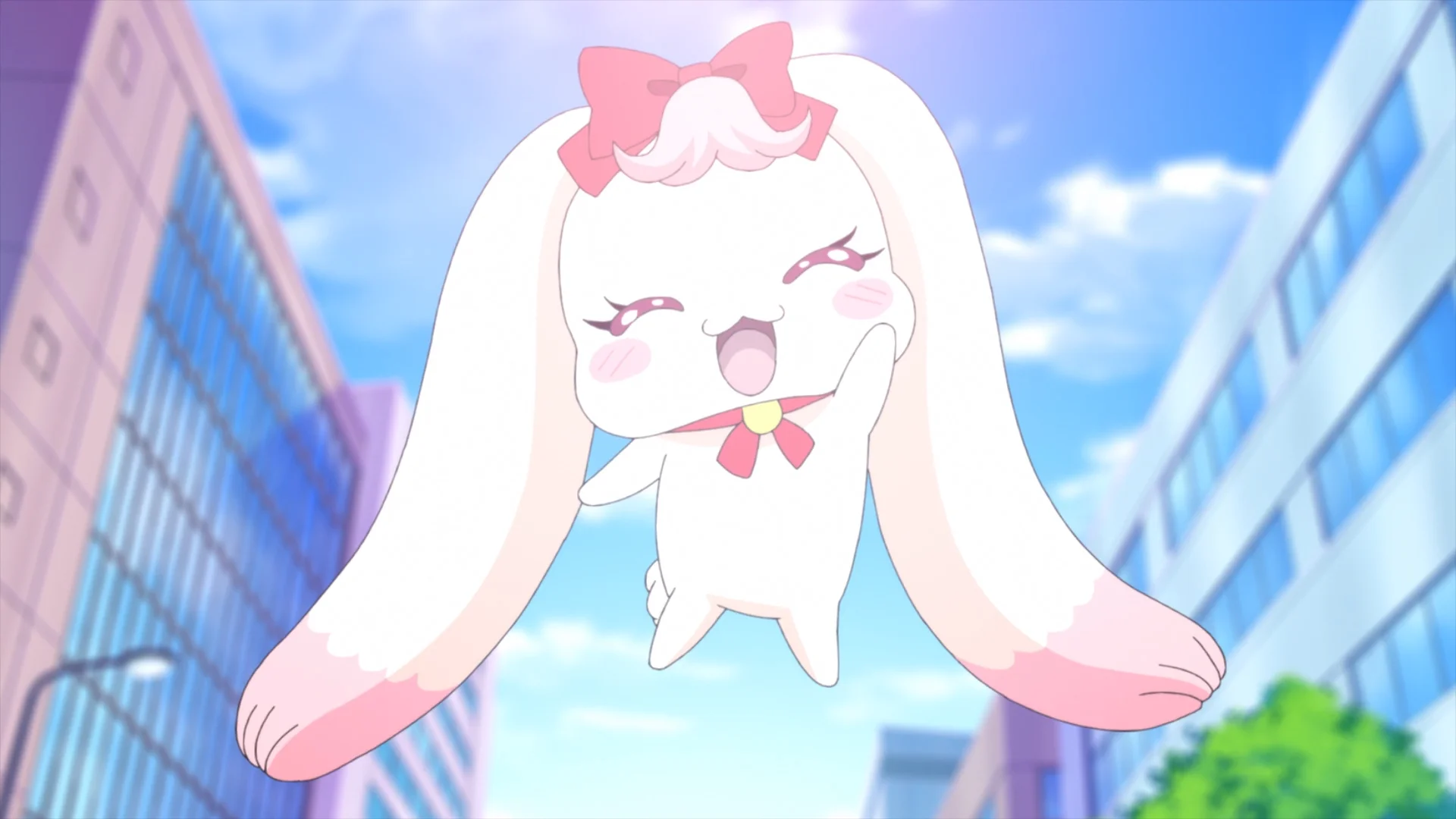
Otona Pretty Cure 2: Civil War.
I've never been a fan of the Nozomi x Coco 'ship, although I have to assume it's reasonably popular among the sort of audiences for whom Yes! Pretty Cure 5 was originally intended. In case you somehow still don't know, Coco is an adult who (we now learn) fell for Nozomi when he lured her into an alley met her by chance when she was 13. He was also her middle school teacher. Oh, and his human form is the alter ego of his real form, a ridiculous fairy mascot who is lucky to have Nuts by his side to make him look competent in comparison. And, yeah, he's the (a?) monarch of Palmier Kingdom, a country populated entirely by ridiculous fairy mascots doomed to fight an unavoidable water-rights war with the neighboring Donuts Kingdom. I expect losing this war will trigger the coup Milk has planned.
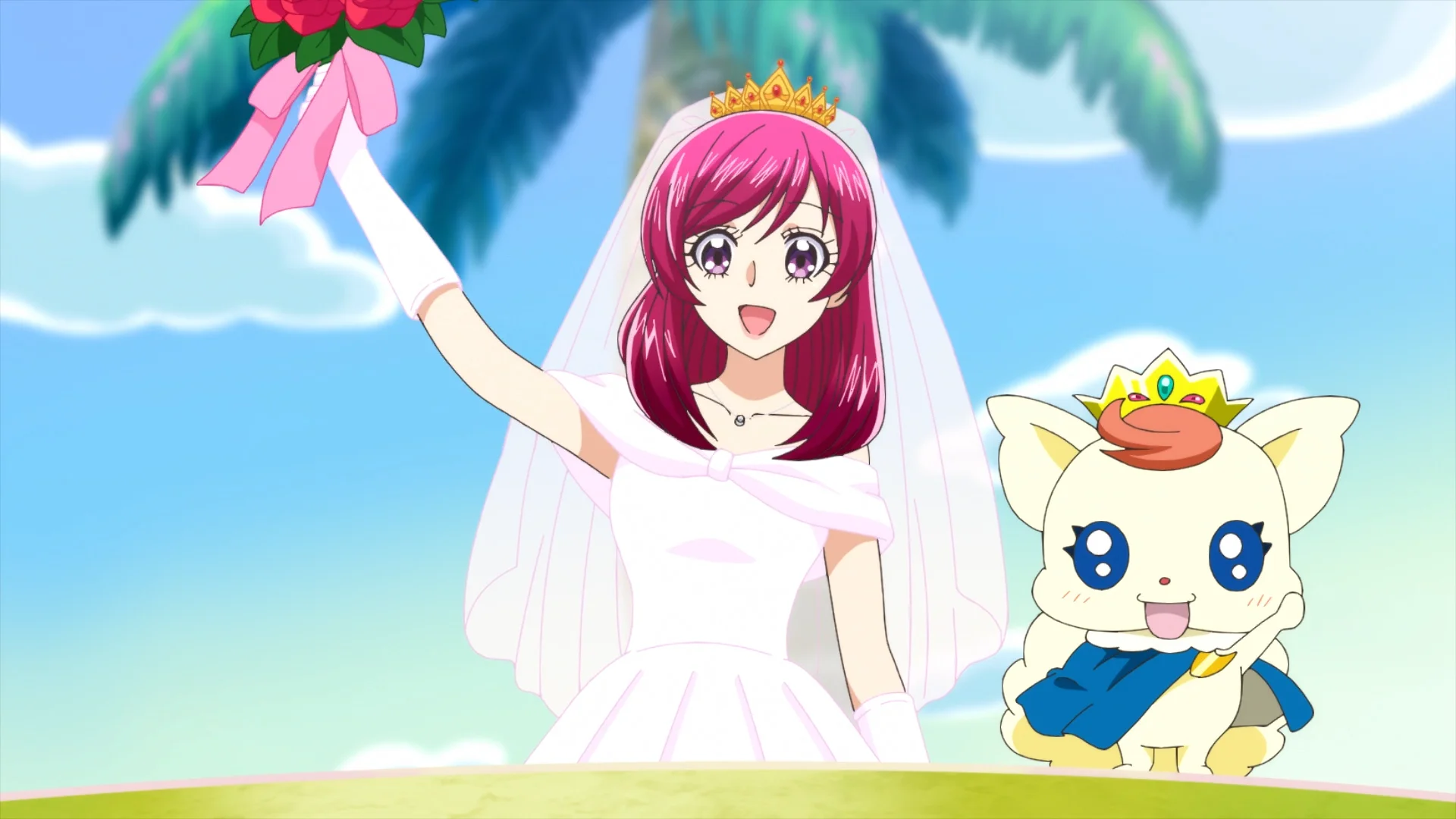
Was Coco in his fairy mascot form during the ceremony?
Did he include his verbal tic when reciting his vows?
ANYWAY, back in 2008, Coco and Nozomi (Cure Dream, technically) shared the first (and only?) on-screen kiss of the Pretty Cure franchise. Although Otona Precure did not feel beholden to pairing up Saki with Mai's brother, or Komachi with Nuts (Natts, whatever), or Urara with Syrup, it did not pass up the chance to goose the Nozomi x Coco 'shippers. So, now they're married (which really raises a lot of questions if you think about it even a little bit, but I recommend not dwelling on it at all), which explains why Coco was sort of hanging out for the second half of the show doing fuck all. He didn't need to be there, but I guess he did if he and Nozomi were going to get married. That didn't really need to happen during this season either, but I guess it did if "this season," is going to be "the only season," and there's no guarantee it's not. Maybe someday we'll get some more. Each tomorrow is but another possible future.
Posted in Futari wa Precure, Kibō no Chikara ~Otona Precure 23~, Pretty Cure (all), Splash Star, Yes! Precure 5 GoGo!, Yes! Pretty Cure 5 | Tags: Autumn 2023, Christmas Cake, Love Confessions, Mahou Shoujo, May-December Romances, Romance, Season Conclusion, Sequels, Spoilers, Twitter | Permanent Link
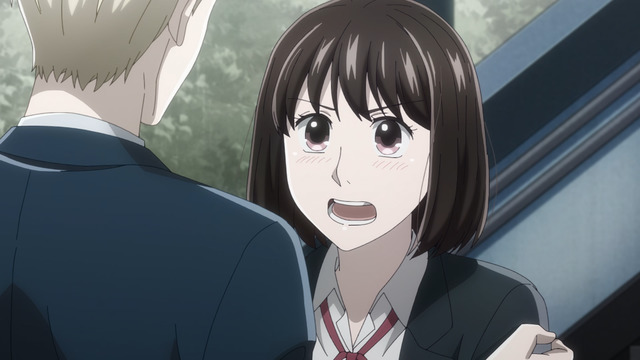
They're not flirting.
I started the Spring 2021 season with an entry covering both Koi to Yobu ni wa Kimochi Warui (It's Disgusting to Call This Love or KoiKimo) and Hige wo Soru. Soshite Joshikousei wo Hirou. (I Shaved. Then I Brought a High School Girl Home. or HigeHiro), so I guess I should have a post wrapping them up as well. I found KoiKimo to be a better series, perhaps because of its straightforward story. It also helps that KoiKimo leaves Ichika in control of her fate. It is ultimately Ichika's decision whether her relationship with Ryo will advance or not.
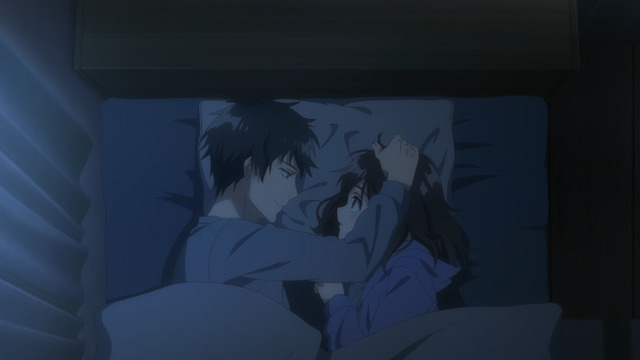
Platonic head pat.
Sayu does not have this luxury in HigeHiro. Maybe it's disingenuous to claim HigeHiro is about Yoshida "looking for something attractive to save" (my apologies to Liz Phair), but replace Yoshida's name here with "the audience's surrogate," and maybe it's not far off the mark. KoiKimo and HigeHiro both ended up where I expected, but Sayu had much less say over the path she took to get there.
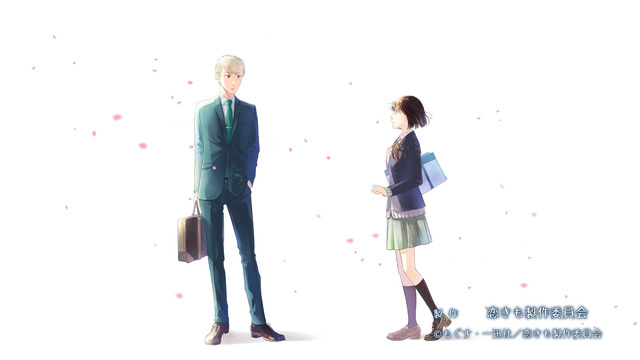
Making the end credits look more like the manga art was a nice touch.
In contrast, KoiKimo is an honest romance. There is no real mystery whether Ichika and Ryo will actually end up together or not, even though KoiKimo does introduce rival love interests for both leads. Moreover, the rivals are genuinely more sensible partners from every objective metric. However, the most obvioius impediment—the age gap between Ichika and Ryo—is never depicted as a meaningful obstacle. When it is finally viewed as a problem, its solution is entirely unsurprising.
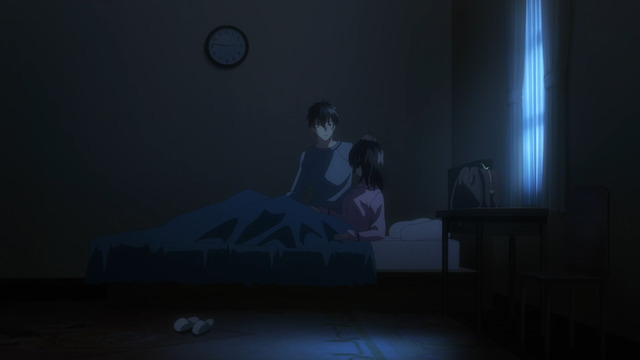
Platonic head pat.
The solutions to the challenges presented in HigeHiro are also fairly obvious, but the series insists on pantomiming a number of unconvincing feints. They're unconvincing because Sayu basically has no flaws, and Yoshida clearly feels something for her. He never has a reason to turn her away, and Sayu's rivals for Yoshida's attention are dubious love interests who quickly end up supporting Sayu anyway.
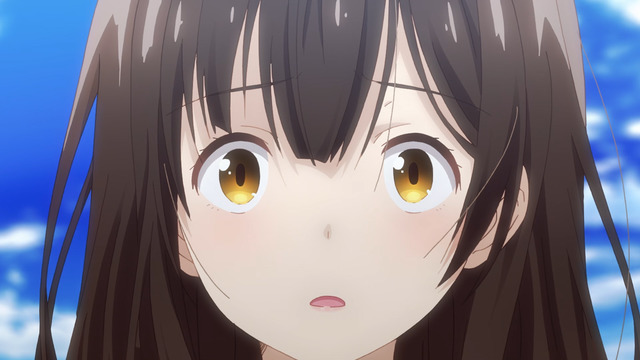
Relax, Sayu. Wonder Eggs are only 500 yen each.
In fact, Sayu's true adversaries are her lack of self-worth, her family's disinterest in her welfare, and the story's insistence at making Yoshida obtuse. Yoshida's behavior is baffling in HigeHiro, and not just because he denies being attracted to the sexually available high school girl living with him. Yoshida's behavior is baffling because he's willing to accept immediately on faith that Sayu would be better off returning to her home, without ever examining even the slightest bit the reasons why she ran away in the first place. It seems irresponsible to not at least contemplate the myriad awful situations that potentially compel teenagers to leave home and offer sex to strangers just to survive.
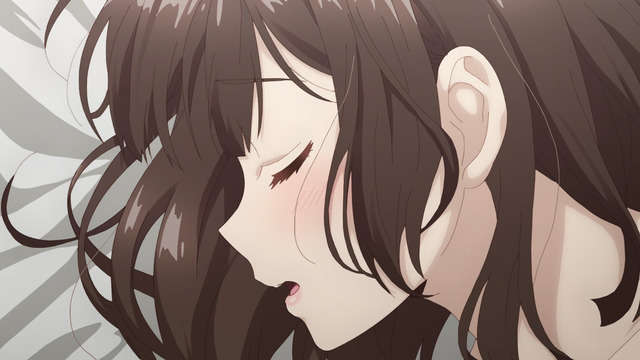
HigeHiro showed Sayu orgasming on screen.
Of course, the real reason Yoshida never asks is because the story can't let him or the audience know before the narrative is ready. It turns out the unpleasant situation Sayu fled wasn't that bad, but that's the case only because HigeHiro insists on rehabilitating its antagonists immedately after introducing them. This sort of cowardice is a significant weakness of HigeHiro, as it makes its conflicts fairly hollow. The challenges presented in KoiKimo are not intractable either, but at least they don't take on a fraudulent quality.
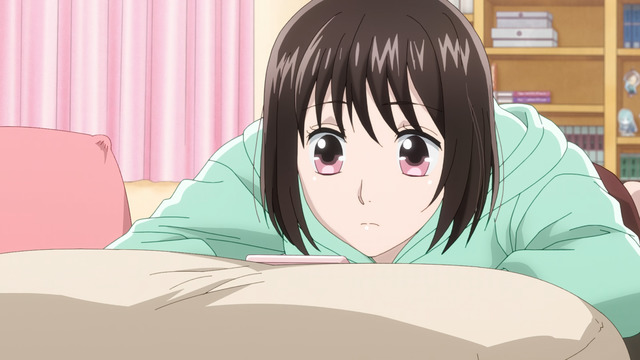
Ichika grew accustomed Ryo's nightly calls without realizing it.
KoiKimo succeeded by being forthright about its romance and committing to it unapologetically. In contrast, HigeHiro (like Yoshida himself) spends basically the entire series maintaining an unconvincing veneer of plausible deniability over whether or not Sayu is an actual love interest. At the risk of attracting accusations of being in favor of age-inappropriate pairings, I'm going to suggest HigeHiro does this to its detriment.
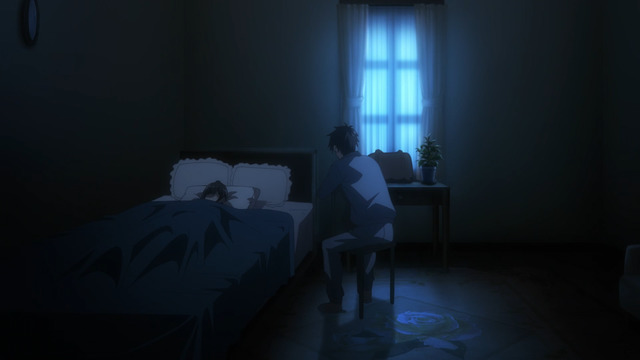
They had to put him in a chair watching her sleep
so people wouldn't insist they still fucked.
I suppose I can't speak for its source material, but the anime most certainly portrays Sayu as an eligible partner. Does HigeHiro provide Sayu with agency by having her test Yoshida's resolve each time she propositions him? Or does the series undermine Sayu's agency by presenting these moments solely so Yoshida can continue to rebuff her and showcase his unflagging integrity? I'm not answering this rhetorical, but I think we all know.
Posted in Hige wo Soru. Soshite Joshikousei wo Hirou., Koi to Yobu ni wa Kimochi Warui | Tags: 16-year-old love interests, Bad Things Happen to Good People, Bend Her Over a Kotatsu, Built for Sin, Christmas Cake, Compare and Contrast, Fan Service, Hanakana Distortion Field, Hanazawa Kana, Harem Comedy, Light Novels, Love Confessions, Love Triangle, Manga, May-December Romances, Plying Girls, Rape, Romance, Season Conclusion, Sex, Spoilers, Spring 2021, tsundere, Unrequited Love | Permanent Link
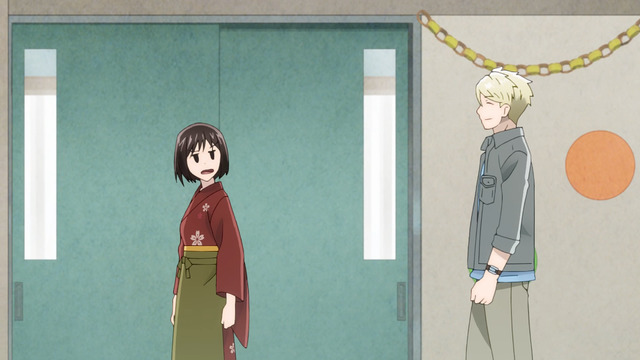
Stalker distancing.
News that the Spring 2021 anime season would feature TWO shows about adult men paired with high school girls created ripples across the Twitter, but even this mild outrage waned after viewers discovered neither show was as torrid as anticipated. Descriptions of Koi to Yobu ni wa Kimochi Warui (It's Disgusting to Call This Love, A.K.A. Koikimo) in particular concentrated on elements that ranged from misleading (characterizing its male lead as "a womanizer") to outright untruthful (e.g., calling him "sex-crazed...with a wandering eye for women"). At the risk of stereotyping too much, I suspect more attention should have been paid to the fact that the Koikimo manga is described as josei (i.e., for adult women) instead of seinen (i.e., for adult men who miss fucking teenage girls).
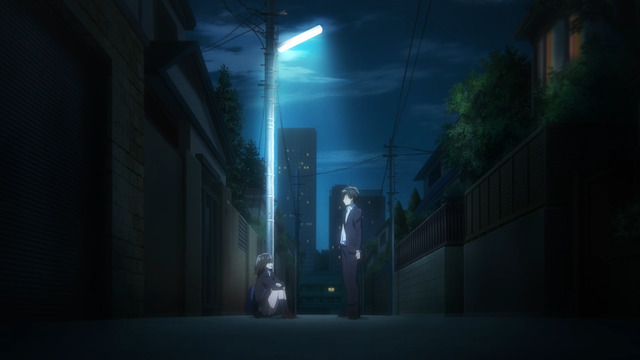
I was too bothered by Sayu's lack of luggage to make a Fate/stay night joke.
Curiously, Hige wo Soru. Soshite Joshikousei wo Hirou. (Higehiro: After Being Rejected, I Shaved and Took in a High School Runaway) seemed to attract less pre-season attention than Koikimo, but perhaps its original novels and manga adaption were already known well enough to deflect unwarranted speculation that it was going to be a smutty romp. This, despite its synopsis outright stating that its characters meet when the titular teenage girl, Sayu, offers sex in exchange for a place to stay. Instead, Higehiro is about a man, Yoshida, who insists he is not attracted to the JK crashing at his place. The series begins with Yoshida being rejected by his long-term crush (his boss at work, no less) who claims she is already seeing someone. He is so devastated that he seemingly does not even notice she was CLEARLY LYING.
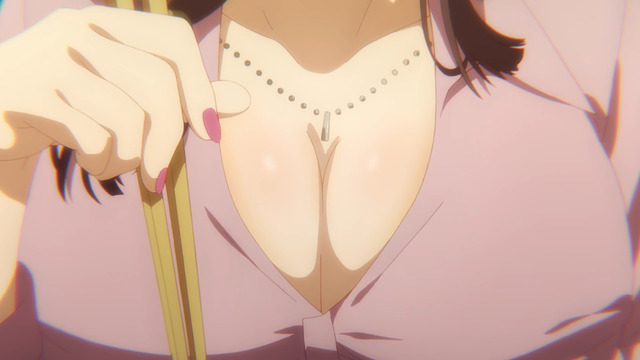
Dude, you're staring.
Higehiro also draws attention to Yoshida's insistence that he is not a "nice guy" for letting Sayu live with him without strings attached (unlike everyone else she has stayed with during her previous six months as a runaway), but rather that the other men she has known are despicable people. Yoshida also repeatedly insists he is not attracted to Sayu because he only likes women with large breasts, but then the show promptly undercuts him by immediately alerting (and repeatedly reminding) the viewer that Sayu's boobs are also comfortably big.
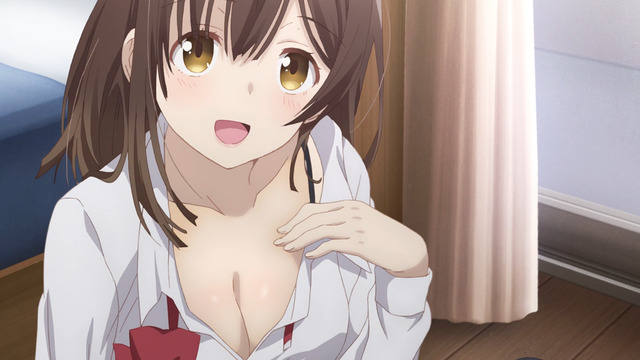
Higehiro even quantifies the comparison.
This is where I lose the ability to predict the path Higehiro will take. There is enough fan service and "male gaze" to the anime that we are obviously supposed to see Sayu as a legitimate love interest of Yoshida's, despite (or perhaps because of) his loud denials. But the show also retains the harem elements by keeping the CLEARLY LYING boss lady and deliberately slapdash co-worker near as potential romantic rivals. If I had to guess how this story ends, I would expect Yoshida's support to put Sayu on a path to success before re-uniting the two after a multi-year timeskip apart that has given Sayu time to become a self-sufficient adult with even bigger boobs than ever. Alternatively, we'll get a cop-out non-ending ending, potentially with all four of them living together for contrived reasons.
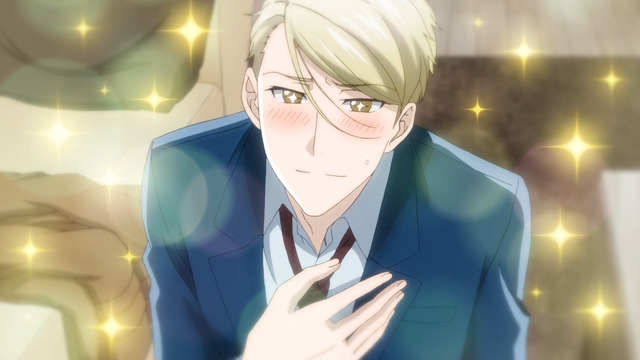
You can tell he's sincere because of the sparkles.
While Higehiro is about a man who denies being attracted to the teenage girl living with him, Koikimo is about a man openly and aggressively wooing a high school girl 10 years his junior. At this point, I think it is necessary to acknowledge the tropes that govern this story's boundaries. Ryo and Ichika meet by chance and a suspension bridge moment sparks his sudden obsession with Ichika, who is coincidentally classmates with Ryo's kid sister, Rio. Fortunately for Ryo, his sister not only approves of his infatuation with her friend, but even volunteers as his wingman to provide opportunities for him to get closer with Ichika.
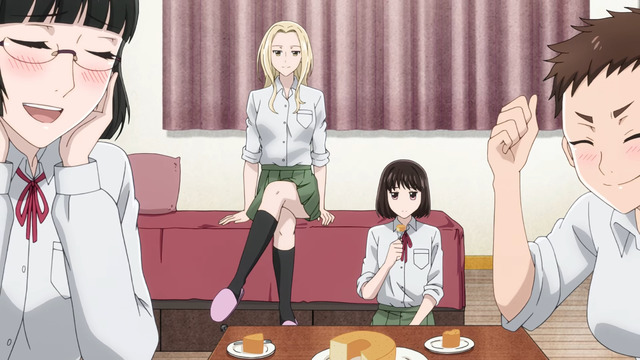
Rio's anime bed is made of concrete.
Moreover, Ichika's own mother approves of Ryo's courtship, despite Ichika's clear displeasure. It is probably worth pointing out that Ryo has apparently never had to pursue a love interest before. He is not a pick-up artist chasing after fresh prey. Instead, girls and women have thrown themselves at him his entire life (Ichika's and Rio's classmates all unanimously agree Ryo is exceptionally handsome), so this is an entirely new experience for him.
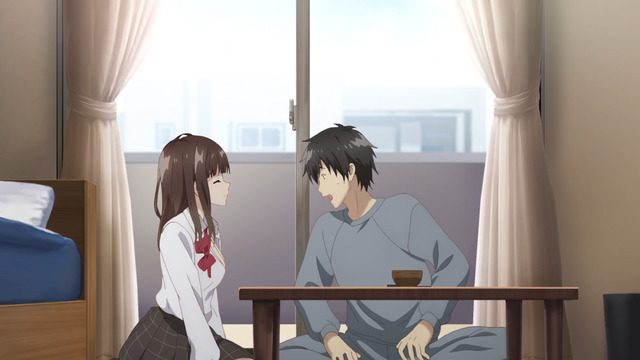
Dude, you're staring.
So what are Koikimo and Higehiro both missing? Lust. In the case of Koikimo, Ryo is clearly, genuinely smitten with Ichika, but he is arguably more drawn to her disinterest in him than he is to her physical appearance. Ichika is presented as being fairly unremarkable among her peers, and her own best friend describes her as "normal" (although at least one boy at her school has taken a liking to her). In the case of Higehiro, it takes three episodes of the show loudly signalling that Sayu is comely and sexually available before Yoshida finally admit he finds her attractive. However, his refusal to sleep with her is predicated on a critical, foundational cornerstone to the narrative's integrity, so I don't expect the story can too easily reverse this stance even if the audience comes to think he protests too much.
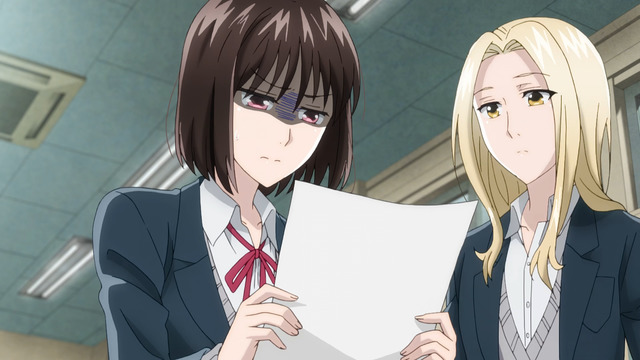
She is upset because she is pleased.
After four episodes of Koi to Yobu ni wa Kimochi Warui and three episodes of Hige wo Soru. Soshite Joshikousei wo Hirou., I enjoy Koikimo more than Higehiro. Neither series is especially realistic (although I could believe Higehiro, despite the melodrama, were it not for the CLEARLY LYING Christmas-cake boss lady and the co-worker who deliberately fucks up her work for Yoshida's attention), but I find Koikimo more amusing. I can't rule out the possibility that I'm simply more enamored of Ichika's seemingly endless barrage of disgusted faces than I am with Sayu's "pretty big for a high school girl" bosom, though.
Posted in Hige wo Soru. Soshite Joshikousei wo Hirou., Koi to Yobu ni wa Kimochi Warui | Tags: 16-year-old love interests, Bend Her Over a Kotatsu, Built for Sin, Christmas Cake, Compare and Contrast, Harem Comedy, Light Novels, Love Confessions, Love Triangle, Manga, May-December Romances, Plying Girls, Rape, Romance, Season Introduction, Sex, Spring 2021, tsundere, Twitter, Unrequited Love | Permanent Link
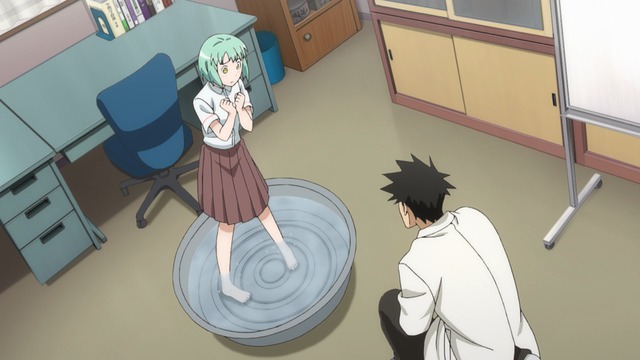
I wonder where they got the water.
SDS of Ogiue Maniax fame recently remarked that his circle of friends and co-workers "automatically gravitate towards pairings" and that they were skewing his perception of anime fandom. This struck me as somewhat odd, but the more I thought about it, the more I had to admit the practice is much more commonplace on, say, the Twitter, than I had noticed. Because I am not a 'shipper, I guess I never appreciated how prevalent 'shipping happens to be, and that fans who reflexively 'ship characters of shows they watch might respond with greater aversion to implications that I might ignore.
(more…)
Posted in Demi-chan wa Kataritai | Tags: Bend Her Over a Kotatsu, Christmas Cake, Harem Comedy, May-December Romances, Romance, Winter 2017 | Permanent Link
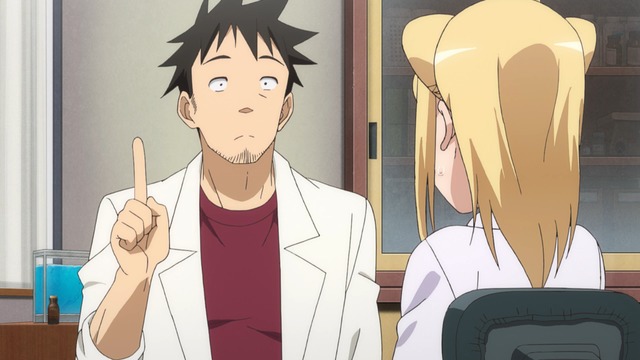
Dude has really long fingers.
No, not the teacher who is a succubus. She's just another Christmas cake virgin, same as practically all female teachers in anime. (P.S. Spoilers.) I'm referring to the male teacher, who is perhaps the rarest of anime creatures: The adult male lead in a harem comedy. Or, more specifically, he is an adult male anime character who behaves like a goddamn grown-up despite being the lead in a harem comedy.
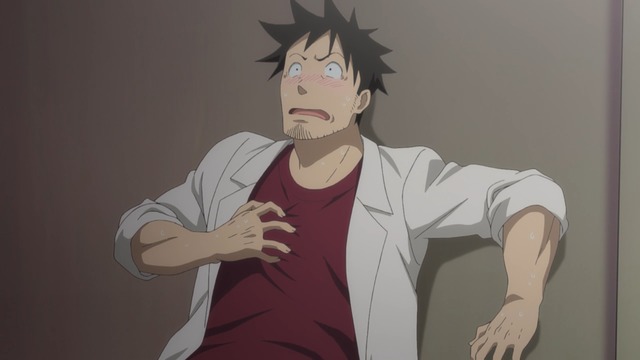
Well, at least he can keep it together when people are watching.
Demi-chan wa Kataritai (Demi-chan Wants to Speak, localized as Interview with Monster Girls) certainly is a harem comedy. After only three episodes, one character has already openly expressed her affection for Tetsuo (a biology teacher in his early thirties), a second character stated the same privately, a third character just isn't being up-front about it, and the fourth simply hasn't been properly introduced yet. Nevertheless, he's sincere when he claims his interest in his non-human students and co-worker is purely academic, and calmly interacts with them without any of the usual carrying on you get in harem comedies. This is a sharp contrast to, say, Potato-kun in Seiren who is insufferably spastic as he struggles with his adherence to the Otaku Virtues. (It turns out Seiren is...not a good show.)
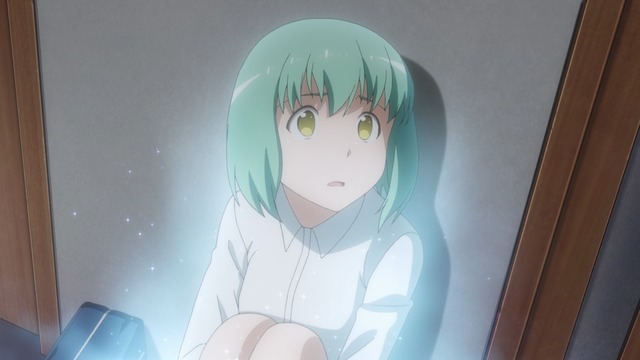
Please don't name your snow daughters Yuki.
Nevertheless, Demi-chan is still a harem comedy, and it's pretty clear the teenage vampire, dullahan, and "snow woman," as well as the adult succubus all (or eventually will) pursue Mr. Takahashi as a romantic love interest. This has caused some viewers to express (at least on the Twitter) a bit of discomfort and/or displeasure with the direction the show is taking, even though it's all but assured there will be zero development on any of these routes. C'mon, it ain't that sort of show, okay. Nobody is going to bend Kyouko over a kotatsu while her head is in a different room.
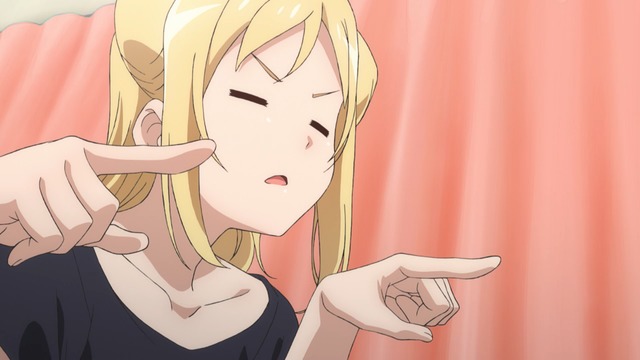
This is not the Koi Dance.
There is one additional thing: It seems some viewers feel inspired to critique the show from a considerably more "woke" perspective than I use, but I think this tendency also results in the adoption of a perversely opposite position from what was perhaps intended. In particular, I've seen a few people discuss Kyouko, the dullahan, as a disabled character. To me, it is openly racist to presume dullahans are presumptively inadequate or compromised compared to humans. Treating dullahans as dullahans instead of as "disabled" humans is the difference between treating ajin as minorities instead of treating them as "abnormals," in my book, even if you're using the politically correct term "demi" instead.
Posted in Demi-chan wa Kataritai, Seiren | Tags: Bend Her Over a Kotatsu, Christmas Cake, Hair, Harem Comedy, Otaku Virtues, Season Introduction, Spoilers, Vampires, Winter 2017 | Permanent Link
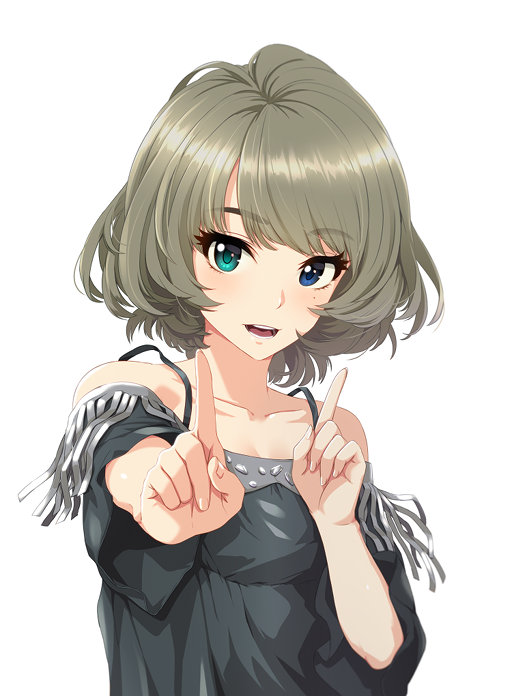
Kaede is also the same age as Mikuri.
I started watching Nigeru wa Haji da ga Yaku ni Tatsu (literally, Running Away Is Shameful But Helpful, but officially, We Married As a Job!) because of the above piece of fan art of Kaede posing curiously. It was obviously a reference to something, but I wasn't familiar with its origin. Thankfully, the Twitter pointed me towards the JDrama source.
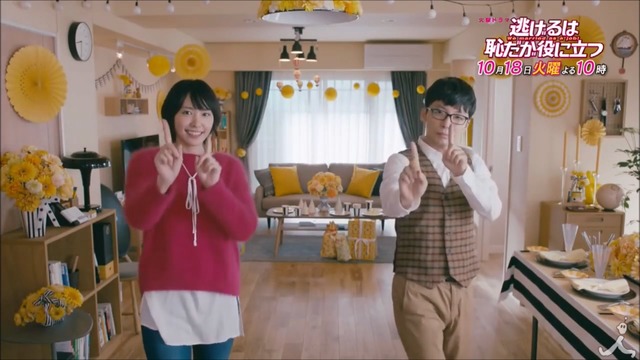
That is a lot of yellow.
Since this occurred during the downtime between anime seasons, I figured I'd give the show a try. I'm not quite halfway through its 11 hour-long episodes, but it seems pretty good so far. The production values do have that sort of home video lighting which seems characteristic of Asian television shows. The male lead also seems unusually staid for a man in his thirties. I'm not sure if this is because the show is based on a manga, or if he's supposed to represent a caricature of the so-called "herbivorous" man, or if people like him actually are fairly common in modern Japan. In any case, the cast is good, not overly large, and there are no school-aged spazzes in sight—at least, not so far.
Posted in Cinderella Girls, Live Action, Nigeru wa Haji da ga Yaku ni Tatsu | Tags: Christmas Cake, Romance, Season Introduction | Permanent Link
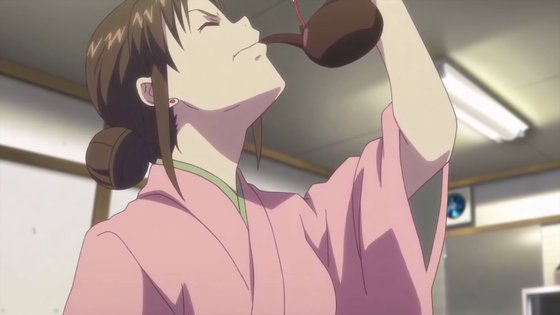
CHUG! CHUG! CHUG!
I knew Tomoe was the best character in Hanasaku Iroha. I'm glad she got a spotlight episode, but I hope it's not the last one she gets for the series.
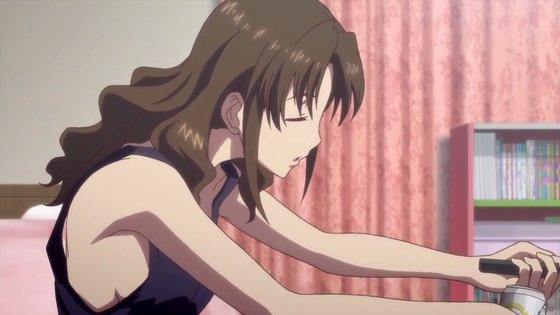
She may be weary...
Another member of the Christmas Cake Club, Tomoe shows why all these shows starring teenagers need older characters around—preferably ones who have their acts together enough to take care of themselves and are resolute enough to make life decisions before the end credits roll.
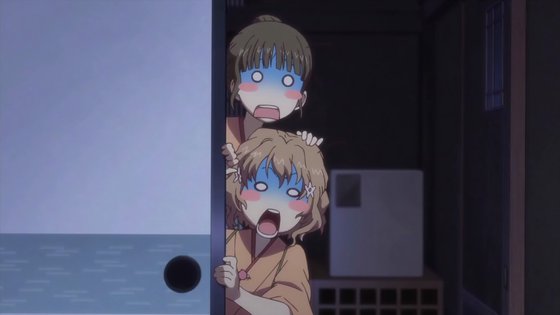
You were too young to see this, girls.
As for the show itself, Hanasaku Iroha is easily the best show I'm watching this season. Most people seem to prefer the other hana show, Ano Hana which is short for Ano Hi Mita Hana no Namae o Boku-tachi wa Mada Shiranai, which translates to "we still do not know the name of the flower we saw that day." What is it with long-ass titles this season? I'm not saying Ano Hana isn't good, but I definitely enjoy it less; every single character on that show annoys me to some level. In the competition between leading shows with hana in the title from spring 2011, it's Hanasaku Iroha in a walk, even if Ohana isn't really dead.
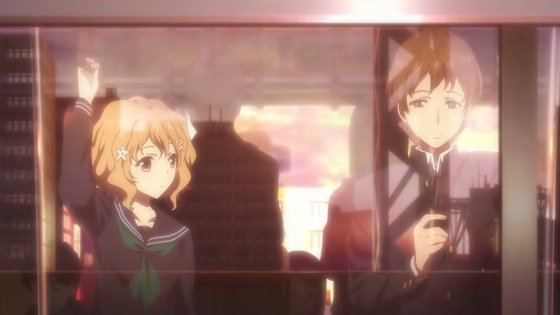
Must be St. Patrick's Day.
In other news, all y'all who criticize the Hanasaku Iroha OP are nuts. It's ridiculously pretty. Oh, right, the voice. Yeah, I guess I can see that.
Posted in BEST GIRL, Hanasaku Iroha | Tags: Christmas Cake, Kanae Ito, Mamikore, OP ED, Spring 2011 | Permanent Link
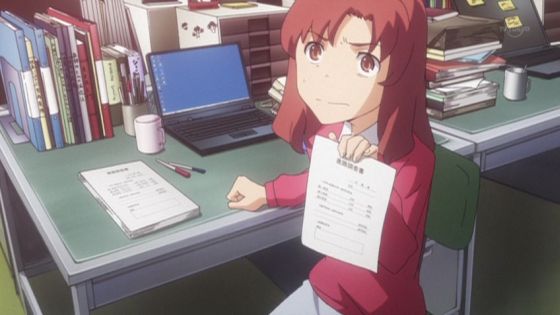
Yuri.
Toradora! prominently features an unmarried woman over the age of 25: Yuri, the teacher (who is actually more than just a little bit past 25). Today's entry celebrates this under-appreciated anime staple.
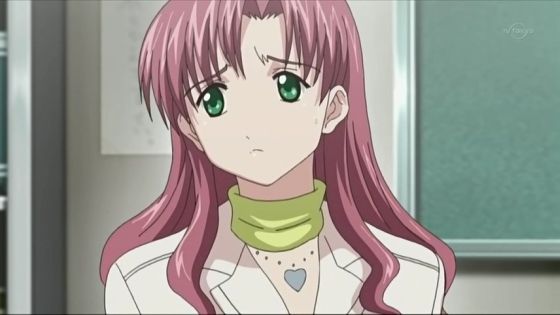
Haruka.
Tokimeki Memorial ~Only Love~ features Haruka, a lonely 27-year-old who wiles away her time drinking Mexico Beer and playing Tokimeki Memorial Online, quietly envious of her preternaturally perfect student, Sayuri.
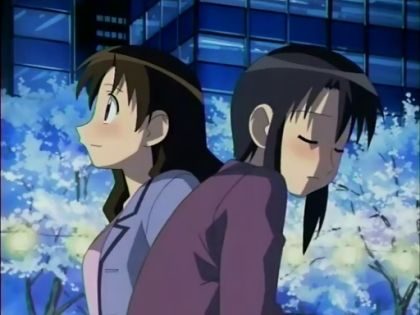
Yukari and Nyamo strike out after a night trolling for husbands.
Yukari and Nyamo from Azumanga Daioh are unlucky in love, despite being the best teachers in the history of anime. (Yes, better than GTO.)
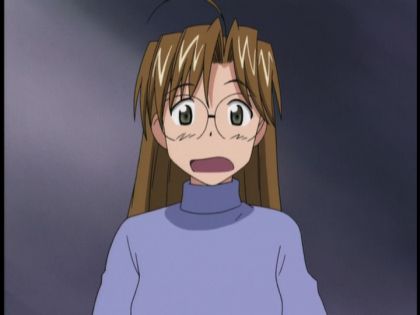
Kagome.
According the the Mao-chan website, Kagome is 27 years old. She is reassigned to teach at Mao's school. Also, she is desperately in love with Mao's grandfather.
Naturally there are numerous other Christmas Cake characters I am omitting, but let us not dilute attention from these five sweethearts today by crowding the room, eh. You're the BEST GIRLS today, ladies.
Posted in Azumanga Daioh, BEST GIRL, Earth Defender Mao-chan, GIMMICK POSTS, Tokimeki Memorial ~Only Love~, Toradora! | Tags: Christmas Cake | Permanent Link
|
|










